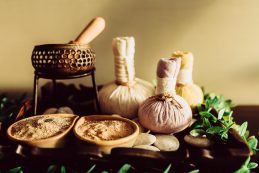Karkidaka Chikitsa is a special health care modality followed by the Keralites in the Malayalam month – karkkadakam.
WHAT HAPPENS IN THE KARKKADAKA MONTH
The Malayalam month Karkkadaka denotes a part of Varsha rtu or monsoon season. In the climatic aspect, it is a drastic change from an entirely opposite Greeshma rtu (summer season) to Varsha rtu (rainy season). Obviously human body also has to overcome this variation.
As how the initial rainfalls at a desert cause a raise in atmospheric temperature, body temperature also get elevated due to the blockage in expulsion of internal body temperature in the initial few days of Karkkadaka month. Thereby the increased core temperature will promote the appetite by igniting the agni or digestive fire temporarily. But gradually as the rain continues, it will bring down the core temperature initially, then digestive fire. In effect it will causes loss of appetite and the accumulation of vitiated pitha dosha in the body. Along with this, the increased coldness in the environment causes the prakopa or vitiatiation of vatha dosha too.
In the system of Ayurveda, vatha dosha is the controlling factor of the entire body system. So, it’s derangement will give rise to the imbalance of all the basic dosha constitution, that means tridosha dushti will happens. In effect it might cause,
- Indigestion – Amavastha
- Accumulation of toxic substances in the body – Ama
- Reduced immunity power – Ojakshaya
- Incidence and spread of communicable diseases (common cold, different types of fever etc.)
- Aggravation of the existing diseases in the diseased ones.
So to overcome these, people from the past adopted karkkadaka chikitsa to restore the lessened sareerika bala (body strength) and to level up their health for the upcoming new year.(Chingam is the new year month of Malayalam year, which is next to the Karkkadaka month).
WHAT IS KARKIDAKA CHIKITSA?
Karkkadaka chikitsa is mainly focusing on restoration of the basic health and rejuvenation of a person. Hence this period is also known as “MONTH OF REJUVENATION”. It can be done only by means of correction of the agni. In Ayurveda, agni is the key element of the health. So by correcting balance of the tridosha, immunity boosting, diseases prevention etc. are possible.
For that, certain medicinal preparations and panchakarma therapeutic procedures are needed. Among the medicinal preparations, karkkadaka porridge/Karkkadaka kanji is a famous one.
IMPORTANCE OF KARKKADAKA PORRIDGE
Basically this preparation is a very simple preparation with easily digeatable ( laghu) and appetiser ingredients (agnideepana). In detail,
- Detoxification (Amahara) – chukku, ayamodakam, dhanyaka
- Improves the taste perception and appetite (Ruchikara) – sathakuppa, uluva, induppu, jeeraka, chukku, ayamodakam
- Reduces the vitiated vatha dosha (Vatha samana) – kurunthotti, sathakuppa
- Immune booster (Ojaskara) – aswagandha, pippali
- Rejuvenation(Rasayana) – aswagandha, pippali, njavara
The medicines in the porridge can be changed according to the condition of the person who undergoes the treatment.
PANCHA KARMA THERAPIES
The aim of Panchakarma therapy is to cleanse the body both externally and internally. First of all, the person undergoing the thereapy should be prepared through certain external procedures like, Abhyanga (oil massage)/Pizhichil/different types of Kizhi( Ruksha, Snigdha, Njavara) followed by Svedana therapy (steaming) and then the actual cleansing procedure can be administrated. It will be either Vamanam or Virechanam, sometimes both Vasthi is the end procedure to control the vatha dosha. This is the fundamental procedure in vatha prakupitha conditions. After to this step by step procedures, normalisation and balance of the tridosha occurs.
FOOD AND REGIMENS SHOULD BE FOLLOWED IN KARKKADAKA MONTH
AHARA
Intake of boiled luke warm water
Increase the fluid intake than the solid food items
Vegetable/ non-vegetable soups
Include old grains and ginger with meals
VIHARA
Herbal oil massages
Proper sleep
FOOD AND REGIMENS SHOULD BE AVOIDED IN KARKKADAKA MONTH
FOOD
Spicy, oily and very much salty foods
Junk foods
Fishes
Potatoes, pulses, curd
Cold foods and drinks
Large amount of solid food
VIHARA
Day time sleep
Awakening in the night
Over exertion


